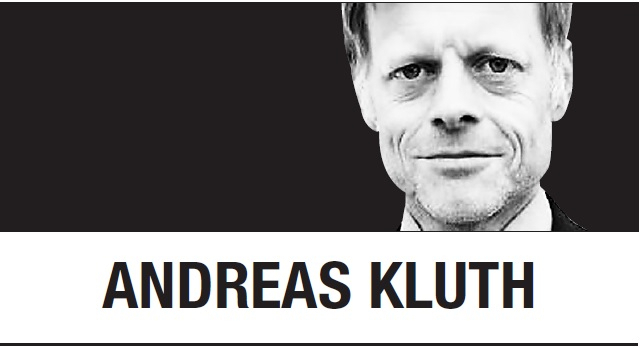
Put aside, if you can, the growing anxiety about Russian President Vladimir Putin going nuclear in his barbaric war against Ukraine. Even if he doesn’t -- and the risk, though real, remains small -- he’s already brought the whole world closer to atomic disaster occurring at some point.
That’s because Putin, with his repeated threats to drop nukes on Ukraine or other European countries, has in effect kicked off a new and global arms race in these diabolical weapons. He has proven, if proof was needed, that having atomic bombs gives you power, whereas lacking them -- as Ukraine does -- leaves you vulnerable.
Scan this month’s headlines from Asia to Europe. In Pyongyang, North Korean dictator Kim Jong-un just launched another round of ballistic missiles -- one of them over Japan and into the Pacific -- and simulated tactical nuclear strikes against airports and other targets in South Korea. He appears to be gearing up for another nuclear test blast, his first in five years.
In France, meanwhile, President Emmanuel Macron was inadvertently too explicit about when he would not use a nuke. Asked how he’d respond to a nuclear strike by Putin in Ukraine or “the region,” he answered that France would not retaliate in kind. Nobody expected him to say the opposite. But as a Western leader with an interest in deterring Putin, he had a job: to shut up and preserve “strategic ambiguity.” His administration is now trying to walk back his excessive clarity.
In this context, NATO’s “Steadfast Noon” actually makes for the only reassuring news. It’s a routine joint exercise by 14 of the 30 allies to practice dropping American nuclear bombs from allied countries’ fighter jets in an emergency. This year’s maneuvers, scheduled long before Putin’s invasion and run from a base in Belgium, are now underway until Oct. 30. Let’s hope the Kremlin is watching.
The nuclear bragging in North Korea and the anxious oversharing in France point to the damage Putin has done with his not-so-veiled threats. As recently as January -- even as Putin was planning his attack on Ukraine -- Russia was one of the signatories in the United Nations Security Council reaffirming the truism that “a nuclear war cannot be won and must never be fought.” What cynicism.
Ukrainians now have a different lesson to teach the world. In the 1990s, they -- along with Belarusians and Kazakhs -- agreed to give up their nuclear arsenals from Soviet times in return for security guarantees from the major powers, most notably Russia. None other than Sergey Lavrov, today Putin’s ever-mendacious foreign minister, signed the paperwork.
If Ukraine had instead kept the roughly 1,900 warheads it had at the time, this year’s war would be going quite differently, and Putin wouldn’t be making nuclear threats. In the brave new world we’re entering -- Putin’s world -- a country’s best bet for staying sovereign, and a dictator’s best bet for staying in power, is to have nukes.
Kim Jong-un got that point long ago. So did the mullahs in Tehran, nowadays besties with Putin, who are permanently on the verge of nuclear “breakout.” China is adding to its arsenal as fast as it can. India and Pakistan may well conclude that they, too, need more or more modern nukes, as could Israel.
South Korea, Japan and Taiwan could start doubting their safety under the American nuclear umbrella and get their own warheads. Turkey, Saudi Arabia and others -- with an eye to Iran, Russia and Israel -- may do the same.
In the European Union, countries such as Poland or Finland that feel directly threatened by Russia may decide that they, too, need atomic deterrents. Even the Germans are talking more seriously about building a national arsenal.
And then there are all the other rogue nations with their tinpot dictators, those already on the map and those yet to emerge from tomorrow’s failed states. They’ll all want to play with fission. Add the specter of non-state actors such as terrorist organizations getting their hands on these bombs, and the dystopia is complete.
The problem is not merely the rising number of nuclear weapons or their increasing variety, from low-yield “tactical” to high-yield “strategic” and everything in between. It’s that this proliferation also necessitates complete rewrites of the nuclear powers’ so-called “postures,” the strategic roles these countries publicly assign to their arsenals as a way of telegraphing their intentions to adversaries.
As of today, only China has officially ruled out a first strike -- and even that policy may no longer seem credible. The revised doctrines must incorporate tactical nukes, flexible strikes and graduated retaliation and escalation. The old and terrifying, but stable, certainties of Mutual Assured Destruction are gone. The brave new world after Putin will look more like Permanently Imminent Apocalypse.
Much will depend on how Putin’s war against Ukraine ends -- not just whether Ukraine survives, but whether Putin does, and even Russia as a country and an anti-Western spoiler in the international system. If Putin is seen to succeed with his attempts at nuclear blackmail, the world is pretty much doomed. If he’s made to fail, humanity may be able to erect new taboos against waging war with atomic fission. In case anybody was still in doubt, the stakes in Ukraine really are global.
Andreas Kluth
Andreas Kluth is a Bloomberg Opinion columnist covering European politics. -- Ed.
(Tribune Content Agency)





![[Graphic News] More Koreans say they plan long-distance trips this year](http://res.heraldm.com/phpwas/restmb_idxmake.php?idx=645&simg=/content/image/2024/04/17/20240417050828_0.gif&u=)